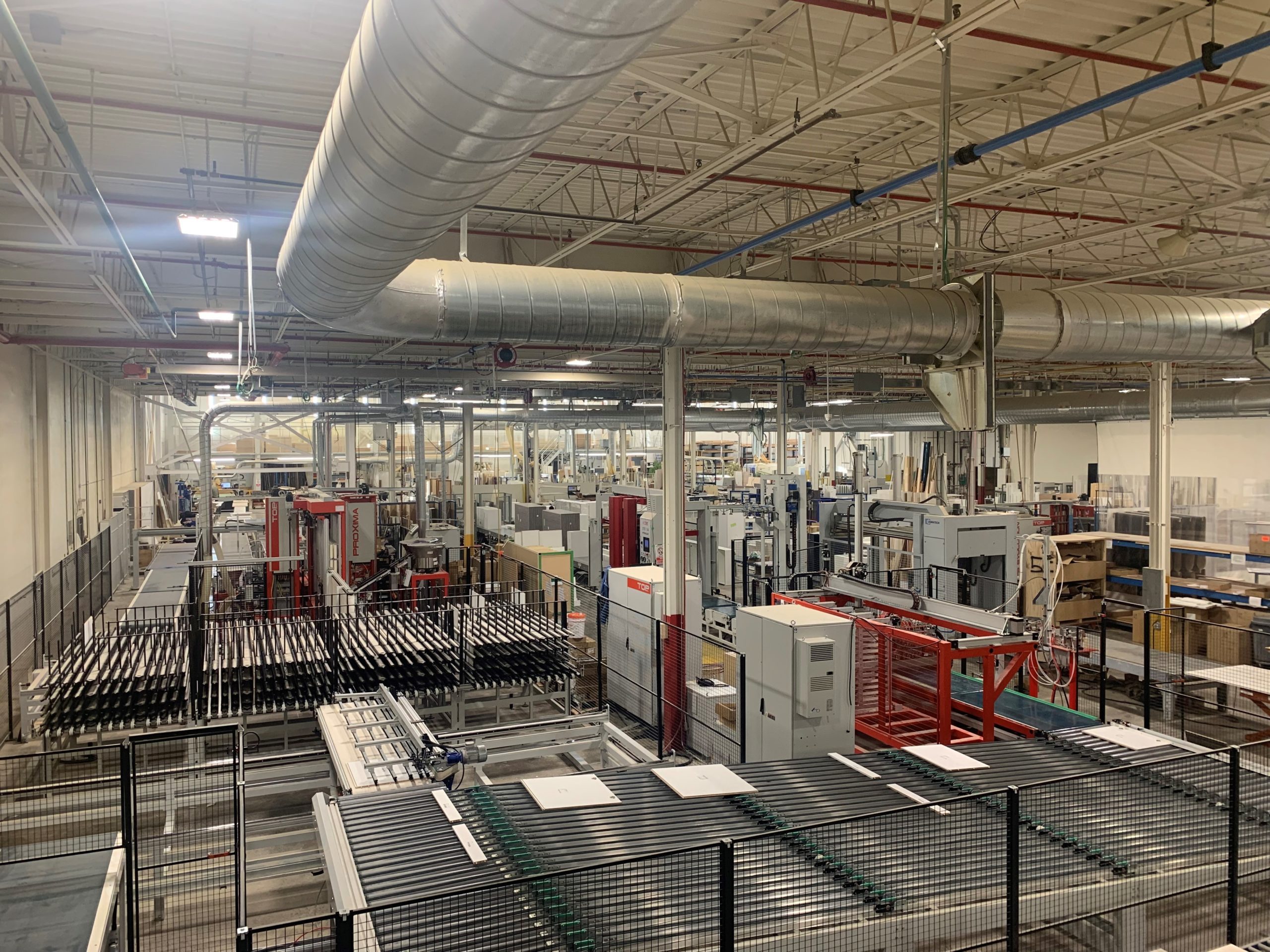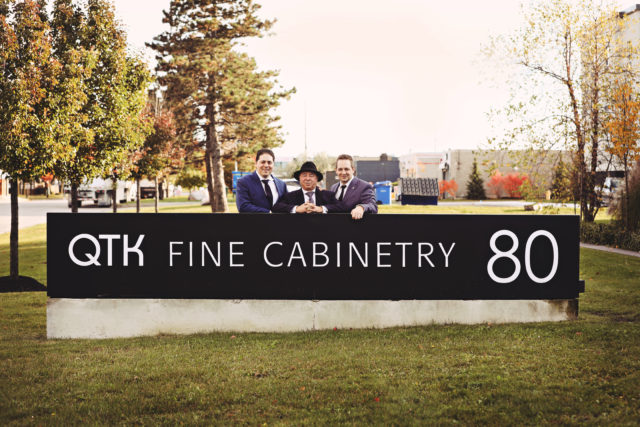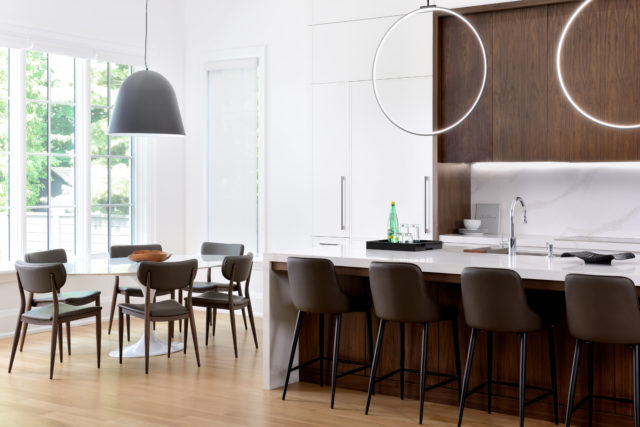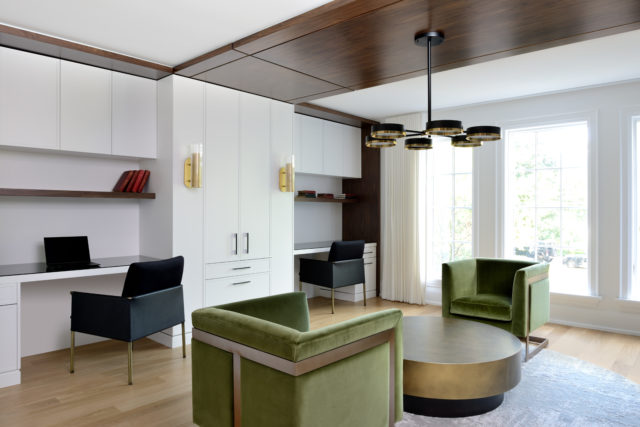-
Headquarters -
80 Sante Drive, Vaughan, Ontario, L4K 3C4
-
Year established -
1974
-
NAICS -
337110 - Wood kitchen cabinet and counter top manufacturing
-
Major expansions -
2018
-
Employees -
50
-
Exports -
U.S.
-
Download -
QTK Fine Cabinetry
It was a visit to the assembly line at Honda of Canada’s Alliston plant that convinced Daniel Toto, general manager of QTK Fine Cabinetry, that kitchen cabinets can be both unique and manufactured at high volumes
For Toto, who grew up learning about QTK’s business on the shop floor, Honda’s low-inventory business model and just-in-time production system were key. He observed that mass customization was possible with precise production scheduling and automated equipment – even in a business whose customers want their kitchens to stand out and reflect their own personalities. What he learned from the auto giant gave Toto a vision to steer QTK in a similar direction.
Delivering each customer a unique kitchen that strikes a balance between form and function is QTK’s promise to its customers. By engaging with them and tailoring the designs for their needs the Vaughan-based family owned company sets itself apart from ready-made kitchen cabinetry providers.
QTK recognized in the 1990s that adopting advanced manufacturing technologies was necessary not only to survive, but to thrive.
Given the high level of product customization and customer engagement QTK provides, one might expect it to be a low-volume producer. But the company punches above its weight thanks to its Industry 4.0 investments. With 50 employees aided by advanced production equipment and software, QTK can individually customize more than 500 kitchens for a single new residential development. It can do so while working on one-off home renovation projects and achieve all within competitive lead times.
Toto says QTK recognized in the 1990s that adopting advanced manufacturing technologies was necessary not only to survive, but to thrive. When Toto’s parents founded the business in 1974, all manufacturing was manual. But as new technologies emerged, the labour market got tighter, and competition against low-cost manufacturers became more challenging, QTK decided to upgrade itself. Mass customization, enabled by higher levels of automation and new software tools, emerged as a viable path for growth.
When Toto joined his brother, Giovanni (the current vice president of QTK) at the company in 2007, their priority was therefore to invest in key technologies to move the company to a made-to-order business model. Moreover, they wanted to build up the company’s mass customization capabilities.
Enhanced design capabilities meant more satisfied customers. Better scheduling led to higher production capacity.
The first investment towards implementing their plan took place that year. QTK purchased a license to use Microvellum, an AutoCAD-based software well-known in the wood products industry for streamlining processes. Daniel Toto developed the first software libraries himself, and built custom add-ons to represent every element and process used in manufacturing. He also developed the CNC machine post processors, the software that converts design files into instructions for the machines. That allowed the new software to communicate with QTK’s equipment seamlessly.
The advantages of using Microvellum were shorter lead times, superior scheduling that allowed more projects to run in parallel, and higher levels of product customization. Most parts could be automatically labeled with barcodes, sorted automatically, and traced by sensors as they moved from one work cell to another. Fewer misplaced or lost parts translated into fewer delays. Enhanced design capabilities meant more satisfied customers. Better scheduling led to higher production capacity.
But there was a significant challenge. Parts that would eventually get painted could not be visibly labeled with barcodes on the surface. These were the parts with the longest lead times and often got misplaced, so it was crucial to be able to label and track them within the plant.
Toto says the software upgrades significantly improved the management decision making process.
To overcome that challenge, Toto turned to a technology that was seldomly used in woodworking: using radio frequency identification (RFID) tags to label and track parts. Although it was a relatively expensive solution, Toto believed the potential returns from increased on-time deliveries would outweigh the costs. However, for QTK, it was important for these tags to be invisible to the end-user. A machine that could automatically and seamlessly insert the tags into cabinet parts was not readily available. After hundreds of hours of searching, Toto finally made the decision to custom build the machine in house and develop the necessary software internally. After six months of experimenting and testing, the solution was rolled out for all painted parts in 2018. Since then the company has been using hidden RFID in painted parts to track information on each painted part for the life of the part.
In 2013, to complement Microvellum’s capabilities, QTK decided to invest in a full-scale enterprise resource planning (ERP) system. It received some funding for the project from the National Research Council of Canada’s Industrial Research Assistance Program (NRC-IRAP). QTK specifically wanted an ERP system that would not modify QTK’s existing processes.
A Burlington-based company, Seradex, offered exactly what it was looking for. While Microvellum and Seradex both worked well for QTK individually, integrating the two was a challenge. In 2015, the company hired a programmer to help. Today, all the information from Microvellum and the shop floor flows directly into Seradex, providing QTK with a fully-integrated platform to streamline and optimize different processes.
Toto says the software upgrades significantly improved the management decision making process. The primary reasons for that were centralized information and near real-time visibility into the shop floor. The upgrades also allowed QTK to be more agile in production and address potential issues before they occurred. With continuous improvement in mind, a review committee gathers once every week to review issues.
...upskilling personnel became an important activity for QTK. The company retrained employees to operate machines that did their work automatically. Others were assigned to higher value-added tasks like quality control.
At the same time as it upgraded the software, QTK also invested in more automated equipment and robots. Toto underlines that the use of automated equipment did not lead to job cuts. But it required a shift in the company’s work culture.
“It is my responsibility to create fulfilling jobs for my employees,” says Toto. “Repetitive work is boring and those tasks can be handled by a robot.” With that belief in mind, upskilling personnel became an important activity for QTK. The company retrained employees to operate machines that did their work automatically. Others were assigned to higher value-added tasks like quality control.
Toto says these changes translated into increased productivity and job satisfaction among employees. They also helped the company retain its most experienced personnel, some of whom have been with QTK for more than 30 years. Toto summarizes the type of culture he wanted to cultivate: “Every single day we should be learning, professionally and personally.”
QTK also focuses on environmentally friendly practices. Since 2004, the company has been capturing, recycling and reusing the residual chemicals from the painting process. All locally-shipped products, which amount to about 95 per cent of QTK’s business, are wrapped in reusable packaging. All of the cardboard used is made from recycled material and reused multiple times before further recycling. Recently, the company has also started upgrading its service vehicle fleet with electric vehicles.
Moreover, all of QTK’s raw materials come from locally controlled forest environments. About 95 per cent of the materials, including Uniboard, Panolam, HDF, maple and red oak come from high-quality Canadian mills. The rest, mostly walnut, comes from high-quality mills in the United States.
The biggest recent challenge for QTK was fluctuations in the lumber market. The rapid rise in the prices and supply shortages in the summer of 2020 put pressure on QTK’s low-inventory, made-to-order model. Most of QTK’s work is based on fixed-price contracts, so passing through the increased cost was not an option. Toto observed that while prices were increasing quality was declining due to material shortages. To mitigate quality issues, the company had to invest in a larger-than-usual stockpile and made sure it had access to high-grade lumber and other quality raw materials.
Despite supply chain headwinds, the company remained on the growth path thanks to its past investments in advanced manufacturing. It exported its products abroad for the first time, to Florida. And with the lumber market back to a more normal state, the company remains positive about the prospects for its made-to-order business.
For a family-owned business like QTK, reaching the scale of some of the low-cost, ready-made cabinet manufacturers was fraught with risks. But by embracing advanced manufacturing and learning from another manufacturer (that was, in this case, in a completely unrelated sector), QTK has been able to build kitchen cabinets that are both unique and manufactured at high volumes.
Published: February 8, 2022
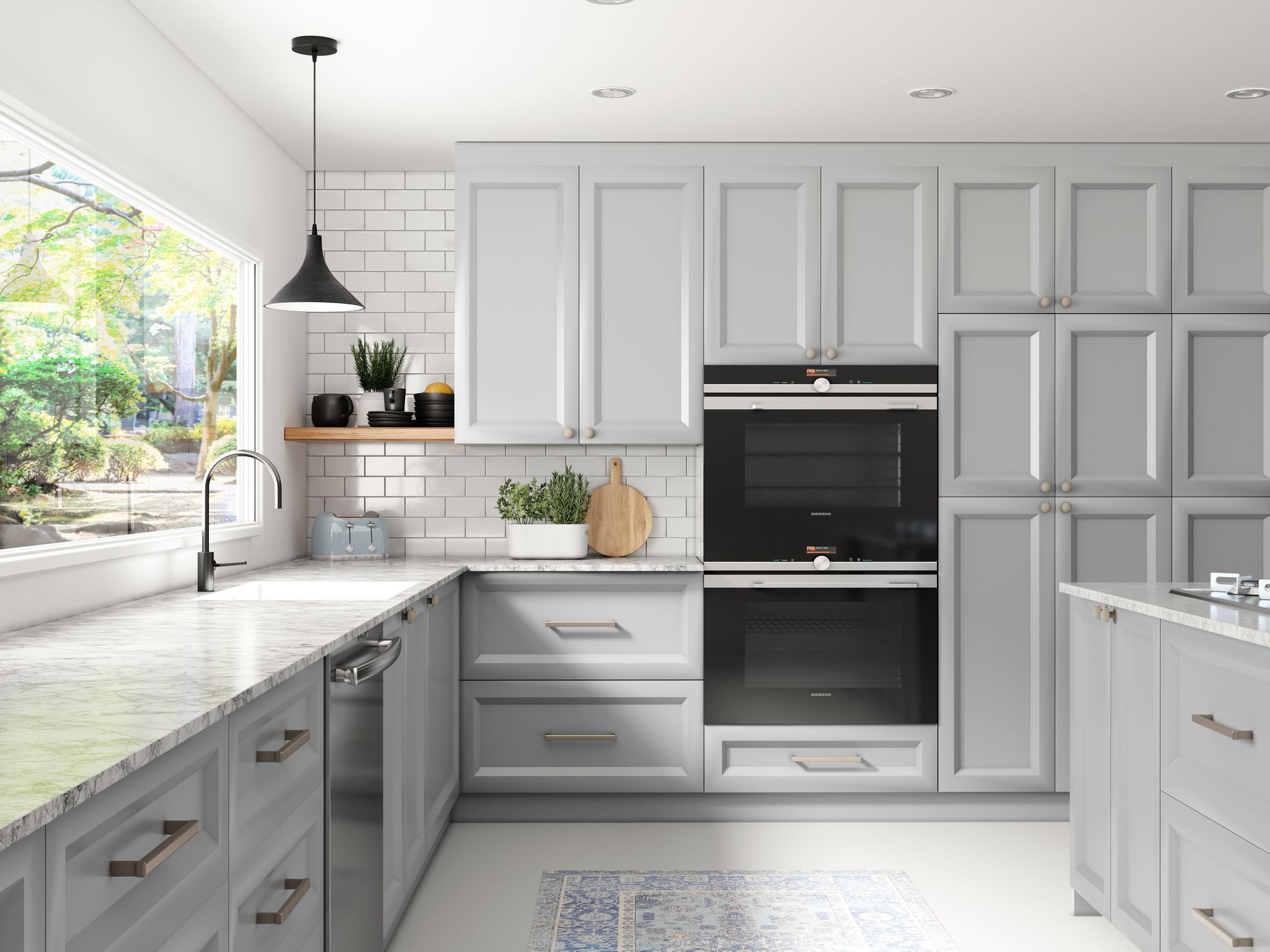
Cutler Group
Eddie Cutler jumped on the idea that one person's junk is another person's treasure. His treasure was wood cuts--purchasing surplus wood and finding customers who could make good use of it. Almost 50 years after its founding in 1973, Cutler Group has expanded from that idea into manufacturing and distributing kitchen, bath and other wood products to beautify homes.

Cabinetree
Cabinetree designs and produces custom cabinetry for commercial and residential purposes. Offering an extensive selection of materials, styles, and accessories, Cabinetree has a reputation for high-quality customization.
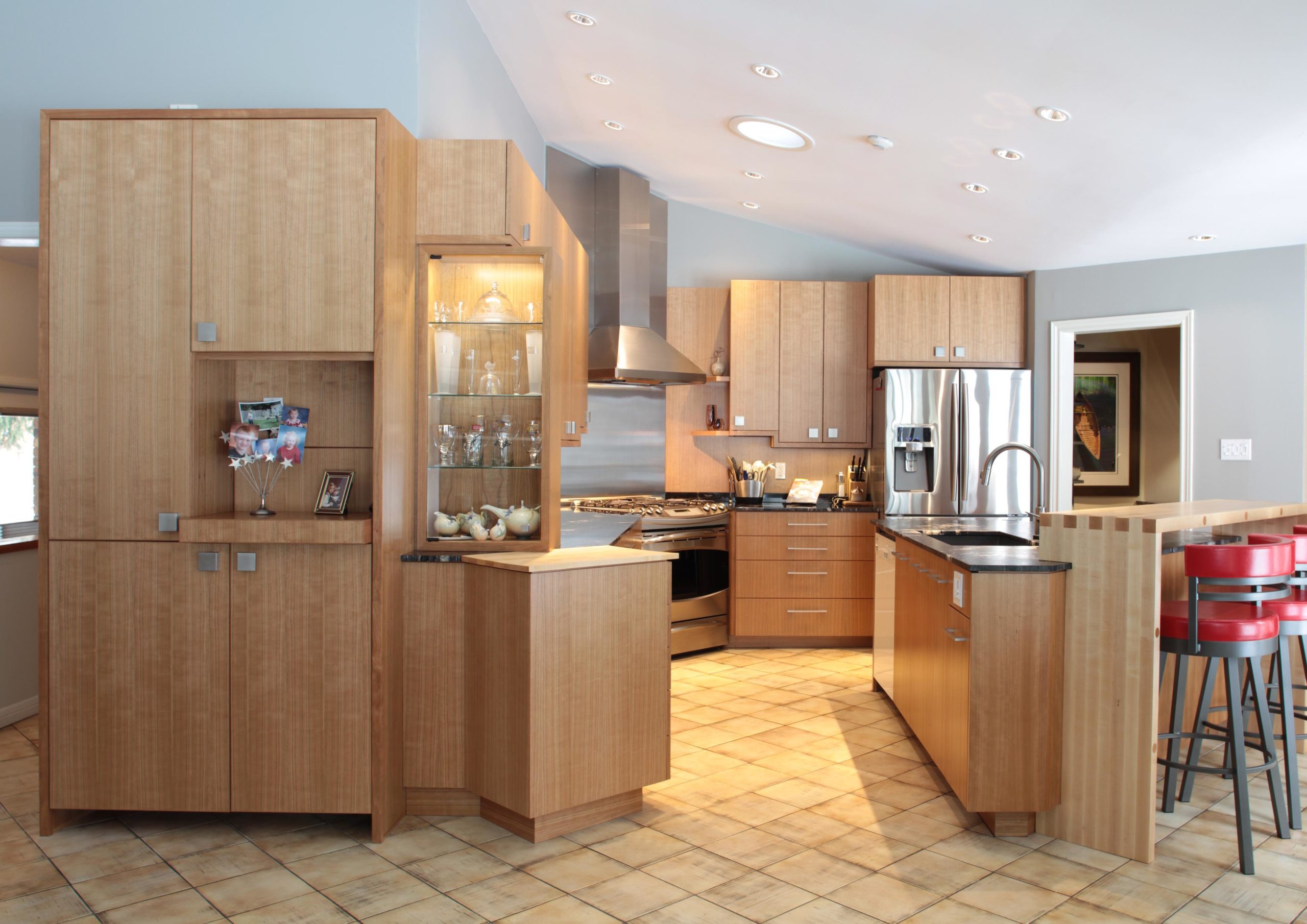
Cardinal Fine Cabinetry
Cardinal Fine Cabinetry has a long and successful history as one of London’s top design firms manufacturing kitchens, vanities and residential millwork.
